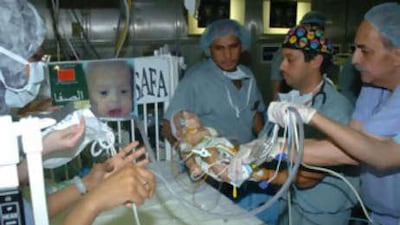RIYADH // For the first time since they entered the world almost four months ago, Alsafa and Almarwa are sleeping in separate beds. The Moroccan twins, born joined at the abdomen and sharing a liver, were successfully separated here on Saturday by a 17-person Saudi medical team at King Abdulaziz Medical City. It was the 19th twin separation performed under the supervision of Abdullah al Rabeeah, an internationally recognised expert on separating conjoined twins.
The surgeon said the eight-hour operation on the Moroccan girls was one of the shortest he had ever done. The girls, who together weighed a little more than seven kilograms, were also "the smallest in terms of weight" and among the youngest separated by his surgical team. "Obviously, all of us are extremely excited at how things went," Dr Rabeeah said at a post-op press conference where he and 11 of his team members, all still in their surgical scrubs, looked happy but tired.
"We're so happy, I cannot express how happy," said Aziza Ibn al Ameed, 23, the mother of the twins. "Not just us," said her husband, Saeed al Eessi, 34, an indoor plasterer. "All the Islamic world is happy - the Saudi people, the Moroccan people." Although not surgically complicated, Dr Rabeeah said, the procedure was complex with regards to the anaesthesia because Almarwa suffers from congenital heart disease and therefore is at high risk of life-threatening developments.
A progress report issued yesterday by the Medical City said that while Alsafa "has stabilised" with "no signs of any complications", the condition of Almarwa "remains very critical". Both remain in intensive care. The operation, in which doctors divided the liver and intestines shared by the girls, was completed more quickly than the nine hours anticipated in pre-op planning. A website dedicated to the procedure (conjoinedtwins.med.sa) carried a "diary" of the seven-phase operation as it was happening, along with pictures and videos.
The diary entry that elated many read: "Phase 5: Separation - 03:00 The twin has been successfully separated and moved to separate beds for the first time." The surgical team under the direction of Dr Rabeeah, who is chief executive officer of King Abdulaziz Medical City, included eight anaesthesiologists, five paediatric surgeons and three plastic surgeons. As with past separation operations, King Abdullah bin Abdul Aziz is covering all expenses for the family at the Riyadh hospital. The king has long had a special interest in assisting conjoined twins.
The Moroccan twins, born on March 15, were flown to the kingdom from their home in Casablanca by air ambulance on April 4. They were placed under observation at the Medical City, which is part of the National Guard Health Affairs compound. Following the decision to go forward with the operation, Dr Rabeeah's team did a "rehearsal" on Wednesday. After the surgery, Dr Rabeeah and his team walked from the hospital to a large auditorium. There, the surgeon, still in his light blue surgical uniform and cap, was asked to cut the first piece of a huge sheet cake bearing pictures of himself, the twins and King Abdullah.
Dr Rabeeah good-naturedly complied, handing the first piece to Abdelkarim al Semmar, the Moroccan ambassador, who conveyed the thanks of his government to the Saudis. Sixteen of the twin separations by Dr Rabeeah were done at King Abdulaziz Medical City and three at King Faisal Specialist Hospital, where he carried out the first such procedure in 1990, Medical City officials said. Three of the 19 operations involved sets in which one twin was dead before the surgery.
Conjoined twins from Mosul, Iraq, are already under observation in Medical City and will undergo separation surgery sometime in the next few months, hospital officials said. @Email:cmurphy@thenational.ae

